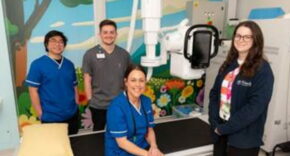
Despite rising inflation and the current cost-of-living crisis, the demand for private healthcare in the UK has risen by almost 40%.[1] This trend can only be a reflection of the crisis point that the NHS is reaching. Indeed, a record 6.73 million people are waiting for NHS care in England alone with almost one third waiting over 18 weeks for treatment.[2]
Community pharmacies stand as an integral gateway into primary care across the country and are a key player on the frontline of our public healthcare system. With the right investment and digital technology, community pharmacies could stand as a solid foundation for curtailing and overcoming NHS backlogs, recruitment issues and compromised quality of care.
Overturning the bleak outcome from community pharmacies
Considering the vital role that community pharmacies play in protecting the nation’s health, which came to the fore during some of the darkest days of the pandemic, it’s alarming that since 2016, one in every 18 pharmacies in England have closed their doors for good, rising to one in five in some areas.[3] This must be addressed and limited.
Many community pharmacies are family-run businesses and lack the investment, time or resources to adapt their services to meet the needs and expectations of the modern patient. The pandemic has accelerated the digital transformation in healthcare, with over 28 million people in England signing up for an NHS digital log-in.
We must capitalise on this shift and use the momentum to drive forwards the digital revolution in pharmacies too, transforming them from a ‘corner shop’ into a valuable gateway to primary care right across the UK.
At Charac, the only platform dedicated to supporting community pharmacies, we are using technology to empower these trusted cornerstones of society to deliver healthcare services in the most effective and accessible way. From scheduling appointments and ordering repeat prescriptions through our integration with NHS IM1, Charac is bringing pharmacies into the digital age and saving pharmacists valuable time for consultations and profit-generating services.
Pharmacies on the frontline: tackling the NHS backlog
With the NHS backlog approaching seven million, there is now an urgent need to invest in community pharmacies and allow them to live up to their potential as a substantial, trusted and critical pillar of both primary and secondary healthcare.
Last May, the NHS announced 35 medical conditions that no longer require a prescription from a GP, creating a space for pharmacies to establish themselves as the first port of call when it comes to seeking healthcare and advice.[4]
From sore throats and mild acne to sexual health testing and blood pressure readings, by addressing these issues pharmacists can free up time for GPs to address more serious health issues. This is increasingly important as the NHS faces a recruitment crisis at all levels with 2,000 fully qualified full-time GPs leaving their posts since 2016.[5]
Out of the 300 million patient consultations carried out each year by GPs, 80 million of these could have been carried out by a pharmacist. Without saving the community pharmacy, the NHS backlog can only increase.
Technology as the solution
Technology is essential to the pharmaceutical industry and always will be. However, nearly 40% of all the pharmacies in the UK are either very small chains or independent stores and therefore often lack the tools, knowledge and funding to incorporate it into their business model.
Charac aims to alleviate this issue by providing a platform that is user-friendly and accessible. In the digital age, patients are now looking to carry out consultations online. Charac opens this possibility for pharmacies that would otherwise not have the means to do so.
Over the next decade, we expect to see more and more pharmacies undertaking virtual consultations and prescriptions as people look for healthcare solutions on demand.
There is an urgent need for technology to support pharmacies that are unable to digitise on their own and it’s this digital transformation that not only has the potential to free up time for pharmacists to carry out essential consultations and relieve some of the pressures on the NHS but manage their pharmacies more cost-effectively and curtail the current flurry of pharmacy closures.
[1] https://www.ft.com/content/81058c84-9b79-4e4d-927a-a85417b665de
[2] https://www.ft.com/content/81058c84-9b79-4e4d-927a-a85417b665de
[3] https://www.dailymail.co.uk/news/article-11088323/Pharmacies-crisis-650-disappear-high-street-six-years.html
[4] https://www.liverpoolecho.co.uk/news/health/nhs-says-35-medical-conditions-23998573
[5] https://www.bmj.com/content/367/bmj.l6463











